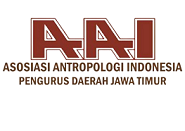The influence of excessive use of social media
Downloads
Armalita R & Helmi AF (2018) Iri di situs jejaring sosial: studi tentang teori deservingness. Jurnal Psikologi 45 (3):218-230. doi: 10.22146/jpsi.33313.
Davison GC & Neale JM (2003) Abnormal Psychology with Cases (8th Ed.). New York: John Wiley & Sons.
Dine J (2010) A Global Crisis?, Companies, International Trade and Human Rights. Cambridge: Cambridge University Press. doi: 10.1017/cbo9780511660139.002.
Harpan A (2015) Peran religiusitas dan optimisme terhadap kesejahteraan psikologis pada remaja. EMPATHY: Jurnal Fakultas Psikologi 3 (1):1-17.
Husaini A (2018) Pengaruh Media Online terhadap Perilaku Kedisiplinan Remaja (Studi Desa Berembang Kecamatan Sekernan Kabupaten Muaro Jambi). Skripsi, Universitas Islam Negeri Sulthan Thaha Saifuddin, Jambi.
Kaplan AM & Haenlein M (2010) Users of the world, unite! The challenges and opportunities of Social Media. Business Horizons 53 (1): 59–68. doi: 10.1016/j.bushor.2009.09.003.
Karmila S (2020) Hubungan Terapan Informasi Makanan pada Media Sosial Instagram dengan Perilaku Makan pada Mahasiswa di Universitas Sumatera Utara Tahun 2019. Thesis, Universitas Sumatera Utara, Medan.
Mahdia A (2018) Pengaruh konten influencer di media sosial terhadap kesejahteraan psikologis remaja akhir. Jurnal Ilmiah Psikologi 11 (2):172-179.
Monica C (2020) Mengenal ‘crab mentality', sindrom psikologis yang menghambat kesuksesan orang lain. [Diakses Desember 2020]. https://journal.sociolla.com/lifestyle/mengenal-crab-mentality.
Ninaprilia Z & Rohmani CF (2015) Gangguan mood episode depresi sedang. Journal Medula Unila 4 (2):182-187.
Pratiwi N & Nola P (2017) Pengaruh literasi digital terhadap psikologis anak dan remaja. SEMANTIK 6 (1):11-24.
Pusat Data dan Informasi Kementrian Kesehatan RI (2019) Situasi Kesehatan Jiwa di Indonesia. [Diakses Desember 2020]. https://pusdatin.kemkes.go.id/article/view/20031100001/situasi-kesehatan-jiwa-di-indonesia.html.
Putri WSR, Nunung N, & Meilanny BS (2016) Pengaruh media sosial terhadap perilaku remaja. Prosiding Penelitian & Pengabdian Kepada Masyarakat 3 (1):47-51.
Rosyanti L, Hadi I, & Fitriwijayati (2018) Memahami gangguan depresi mayor (major depression disorder): Pendekatan psikoneuroimunologi; Kajian sitokin, trypthopan, HPA-Aksis. [Diakses Desember 2020]. https://www.researchgate.net/publication/335676275_E-BOOK_MEMAHAMI_GANGGUAN_DEPRESI_MAYOR.
Sabbah H, Berbari R, Khamis R, Zorkot D, Sabbah S, Droubi N, & Sabbah I (2019) The social media and technology addiction and its associated factors among university students in Lebanon using the media and technology usage and attitudes scale (MTUAS). Journal of Computer and Communications 07 (11):88–106. doi: 10.4236/jcc.2019.711007.
Setiawan D (2018) Dampak perkembangan teknologi informasi dan komunikasi terhadap budaya. SIMBOLIKA 4 (1):62-72.
Sugiyono (2016) Metode Penelitian Kuantitatif, Kualitatif, dan R&D. Bandung: Alfabeta.
Watson D, Clark LA, & Carey G (1988) Positive and negative affectivity and their relation to anxiety and depressive disorders. Journal of Abnormal Psychology 97 (3):346–353. doi: 10.1037/0021-843X.97.3.346.
Yolanda R (2019) Fenomena Relasi Sosial di Era Digital Native (Studi Deskriptif tentang Alienasi pada Kalangan Mahasiswa di Universitas Sumatera Utara). Skripsi, Universitas Sumatera Utara, Medan.
1. The authors agree to transfer the transfer copyright of the article to the Indonesian Journal of Social Sciences effective if and when the paper is accepted for publication. The authors can download the Copyright Transfer Agreement here.
2. The legal formal aspect of journal publication accessibility refers to Creative Commons Attribution-NonCommercial-ShareAlike 4.0 International License (CC BY-NC-SA).
3. Every publication (printed/electronic) is open access for educational purposes, research, and library. Other than the aims mentioned above, the editorial board is not responsible for copyright violation.

IJSS by Unair is licensed under a Creative Commons Attribution-NonCommercial-ShareAlike 4.0 International License.




















